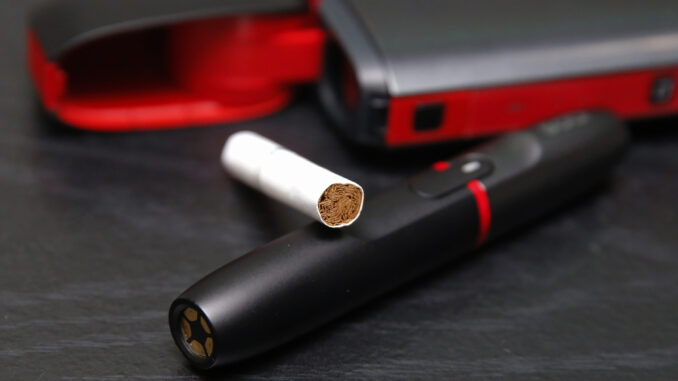
RALEIGH — During a Senate Judiciary Committee meeting on June 19, an amendment to House Bill 900 was approved that would create a comprehensive regulatory and certification process for alternative nicotine and vapor products in North Carolina to be overseen by the Department of Revenue.
The amendment was later approved by the committee as a preferred committee substitute (PCS) to House Bill 900. The PCS was sent to the Rules and Operations of the Senate which approved the measure the same day.
Sen. Mike Lee (R-New Hanover) introduced the 10-page amendment, describing it as “somewhat complicated” because it has a “federal overlay” with the Food and Drug Administration’s (FDA) premarket tobacco product application (PMTA) process for regulating new tobacco products.
“But the amendment’s really simple because what it does in North Carolina is it creates a certification process and that certification process dovetails on the FDA approval,” Lee said during the committee meeting. “It’s managed by the Department of Revenue, and then once they’re certified, they’re listed on a directory”
Lee explained the directory would protect kids and others by allowing stores to check the list to see if their products are approved or not. If they’re not approved, stores have some time to sell what they have left or send it back. After that, they can’t sell these products anymore. He also said companies that break these rules will get “hefty fines.”
Fines mentioned in the amendment include civil penalties of up to $10,000 per product for manufacturers violating requirements. Additional costs are borne by manufacturers, which must provide copies of FDA orders/letters and pay a $2,000 initial fee plus a $500 annual fee per product certified.
Per the amendment, products not on the directory could not be sold in the state after a 60-day grace period upon directory publication.
There are also provisions for unannounced compliance checks of retailers, distributors and wholesalers selling these products and it would also establish penalties for violations related to selling noncertified products.
Manufacturers would be required to appoint an agent for service of process in North Carolina, and the amendment directs the N.C. Department of Revenue to adopt rules for implementation and enforcement and to use the fees collected for those purposes.
If enacted, most of the provisions have an effective date of Dec. 1, 2024.
During public comment, there was opposition to the amendment by lobbyists representing businesses in the state that sell the products in question.
Nelson Freeman and Ches McDowell with Checkmate Government Relations spoke on behalf of Pyxus International, a 170-year-old N.C. tobacco products company, and “1,700 Asian-American owned convenience stores” in the state, respectively.
“The way that the convenience store industry works now is it’s not as profitable as it used to be, and this is one area where they’re able to actually make some money,” McDowell said, adding that “there’s 1,700 of these people in every one of your districts — real jobs, real families, real people.”
“What this bill does,” McDowell added, “will take hundreds of products off the shelf that these folks make money on and rely on to feed their families. So we ask that you take a harder look at this and what this does to our communities.”
Kevin Wilkinson, head of the North Carolina expansion of southeast lobbying giant The Southern Group, spoke against the amendment on behalf of the Vapor Technology Association and described the multimillion-dollar revenue and wage impacts.
“As a result of the proposed bill, 2,095 jobs in North Carolina’s vapor industry would disappear,” said Wilkinson, which he said amounts to “52.1% lost jobs.”
“People working in vape shops for e-liquid manufacturers and firms that supply these companies or serve their employees would lose nearly $107 million in wages,” Wilkinson said. “And overall, the North Carolina economy would be $447.4 million smaller, and North Carolina would lose $105 million of state and local tax revenues.”
A Vapor Technology Association handout obtained by North State Journal argues vape registry bills are misguided, will increase cigarette use by removing vaping alternatives, and improperly involve states in a flawed federal regulatory scheme that courts have found problematic.
The handout also argues the PMTA process is “broken and illegal” based on recent federal court rulings that struck down aspects of how the FDA has implemented it.
The 5th Circuit Court found the FDA acted “arbitrarily and capriciously” and its actions amounted to a “de facto flavor ban” on e-cigarettes without proper notice. Similarly, the 11th Circuit also rejected some of the FDA’s PMTA decisions.
The amendment was added to House Bill 900, which seeks to let the State Board of Education approve new college partners for two special high schools in Wake County. The bill also allows these schools to keep running as special programs while looking for new college partners in 2024-25 and 2025-26.
Lee’s amendment also pulled out House Bill 900’s $111,484 annual allotment to pay for tuition at Wake County’s special high schools.
The funding removal was questioned by Sen. Lisa Grafenstein (D-Wake), who asked Lee if some other provision would be made or if Wake County Public School System would have to “absorb the cost.”
Lee said it was another legislator’s bill so he was not “entirely sure,” adding that he knew, “Wake County and DPI and the board of education all kind of agree with this,” and said, “Hopefully, Wake County will step up and help these schools.”


